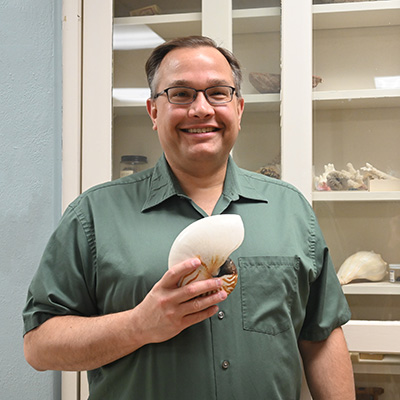
Dave Hoferer
Briar Cliff University Professor Dave Hoferer approaches biology and the natural sciences with a thoughtful approach infused with a large dose of ethics. That comes naturally for the son of a Lutheran pastor, who chose a Lutheran seminary for his grad school, where the degree he eventually earned was theology with an environmental concentration. His master’s thesis involved researching what three theologians said about the relationship between theology and ecology. After that, Hoferer’s doctorate in environment and resources came from the University of Wisconsin’s Gaylord Nelson Institute for Environmental Studies, an institute named for one of the founders of Earth Day, which began in 1970.
For Hoferer, a guiding principle is that “if God creates something, it has inherent value and should not be destroyed,” so he ensures that some biology courses include discussions on how people's actions can have consequences in living things in the natural world.
“I could address ‘the how’ through science and ‘the why’ through ethics,” Hoferer said.
Additionally, Hoferer said it is imperative that Briar Cliff University students who take natural sciences classes be grounded in real-world tasks that drive key points home in a way that rote learning and lectures cannot. The whole focus is on “active learning,” a phrase that Hoferer continually drops into his comments when discussing the work of the Department of Natural Sciences, the academic department for which he serves as chair.
That was a lesson Hoferer garnered during his college years, saying he was somewhat unprepared for his master’s and doctoral years since he previously had so much old-school instruction. Hoferer said many natural science professors at larger colleges have the mentality of, “I am the sage on the stage, and I will lecture you. No. Students here at Briar Cliff get lots of interactive teaching and do research or simulated research so they learn the nuances of the scientific process.”
“Active learning is about students learning about science by doing science. In our classes, students learn how to collect, analyze, and evaluate data. It is not just book learning,” Hoferer said.
Hoferer came to Briar Cliff in 2016, which marked the third college for which he has been a professor. He first was a professor for Eastern University in a suburb of Philadelphia from 2006 to 2011, then at Judson University in Elgin, Illinois, and then moved back to his home state of Iowa for the BCU position. The last four of his seven years at Briar Cliff have included the department chair role, first for biology and now for natural sciences.
In July 2023, the formerly separate biology and chemistry academic departments were merged into the Department of Natural Sciences, a move that Hoferer supports, given that biology, chemistry, and physics comprise the natural or pure sciences and delve into scientific laws and the concerted work to prove or disprove hypotheses.
“I tell people, ‘If you are going to understand biology, without a chemistry background, you aren’t going to understand biology,’” Hoferer said.
The revamped department includes four colleagues in biology, plus a chemistry professor, with plans for adding a few more professors. Hoferer said his role as department chair is to do the administrative work that helps the professors function well, thereby creating space for them to support each other in important teaching tasks. He said the professors buy into the same mentality of active learning, which is boosted by facilities such as the Carver Molecular Biology Teaching Laboratory on the second floor of Heelan Hall.
“We are focused on how to create a coherent curriculum so students can achieve their dreams. (The professors) work well in that way, and we have a real focus on active learning,” Hoferer said. Ultimately, he added, the goal is that “by the time (BCU students) graduate, they are essentially junior colleagues, and you don’t get that by lecturing at them.”.
The students who take Natural Sciences Department courses at BCU are most generally Pre-Med or Pre-Physical Therapy majors. Many depart Briar Cliff to attend medical school, become microbiologists at Siouxland agriculture corporations, work for soil and water systems, the Iowa Department of Natural Resources, or at wastewater treatment plants.
This is part of a series of Faculty Stories profiling all the chairs of BCU academic departments in 2023.